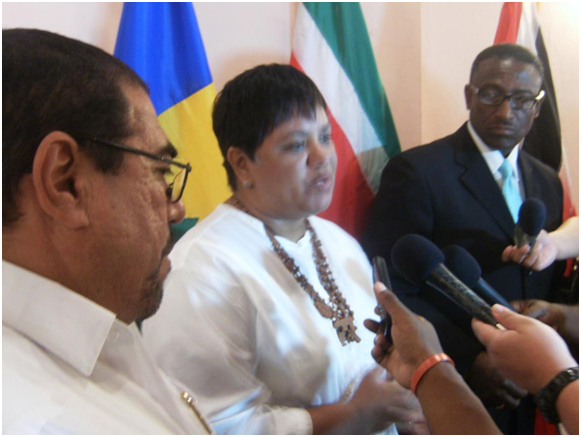by Glenn Tillett

In her keynote address on Tuesday morning, September 4th at the Belize Biltmore Hotel, Belize’s Minister of Forestry, Fisheries and Sustainable Development Hon. Lisel Alamilla referenced the nation’s unique place in the confluence of historical heritage, geopolitics and geography and the opportunity to provide linkages between two sub-regions and even two hemispheres. The historic conference of fisheries ministers culminated with the signing of a memorandum of understanding and a declaration that according to Alamilla, celebrates the integration of the wider Caribbean and Central America.
“It is a great honor and privilege to be given an opportunity to address this first high-level meeting of Ministers of Fisheries across the CARICOM (Caribbean Community) and SICA (Central American Integration System) sub-regions,” Alamilla said by way of introduction. “This vast geographic area has been rightly described by fisheries resource managers and those in the scientific and academic communities as the WIDER CARIBBEAN. Now you will recall in my first statement I did refer to CRFM (Caribbean Regional Fisheries Mechanism) /OSPESCA (Organization of the Fisheries and Aquaculture Sector of the Central American) as “our” sub-region as opposed to “THE” sub-region,” she further explained, “and the reason for this is that the colonial history and political governance structures of Belize legitimizes its place as a part of the English speaking or CARICOM Caribbean. Equally Belize’s geographic placement in the northern reaches of the Central American isthmus and its Latin culture and integration into the political and economic development initiatives of Central America places it in the unique position as a link between the two sub-regions – the CARICOM/ CRFM member states on the one hand, and the SICA/OSPESCA group of countries on the other.”
Twenty two ministers and vice-ministers representing the majority of the 25 nations that encircle the Caribbean Sea, and who are members of the respective sub-regions’ fisheries organizations met to finalize the definitive effort to harmonize their fisheries’ regulations and laws, and coordinate practices and procedures for better governance and management. It is the first-of-a-kind of such meeting for the sector, but hardly a first for Belize which has facilitated similar meetings in other sectors of governance and industry by virtue of its membership in both SICA and in CARICOM.
On Monday, September 3rd the technical personnel from the Caribbean Regional Fisheries Mechanism and the Central America Fisheries and Aquaculture Organization met to draft the Memorandum of Understanding (MOU) and the Declaration while the ministers undertook a field trip to the Hol Chan Marine Reserve. The MOU outlines how the nations via the respective organizations will develop a Joint Action Plan to comply with the mandate of the Third Summit of Heads of States and Governments of SICA and CARICOM that took place in San Salvador, El Salvador on August 19, 2011, which is to be implemented as of January 1, 2013.
The objective is the establishment of conditions that will allow for the formulation and implementation of a program based on a common regional fisheries and aquaculture policy which in turn will improve the outcome for fishers on a long term and sustainable basis.
The ministers responsible for fisheries and aquaculture of the Wider Caribbean declared on September 4th that their nations are committed to the principles for responsible fisheries, and that they share a desire to build and consolidate the foundations for integrated management and sustainable use of the living marine resources of the Caribbean Sea.
The declaration addresses the need for improved conservation and management practices where transboundary species such as migratory pelagic fish stocks and spiny lobsters are concerned with a greater effort to eradicate illegal, unreported and unregulated fishing. Other issues within the declaration include a better integration of the attempt to control invasive species such as the lion fish, the development of unutilized and underutilized resources, proactive policies to manage risks associated with disaster and climate change, strengthen the intra-regional trade in fish and fishery products and the mobilization of resources for training and capacity development among others.
The MOU between CRFM and OPESCA was be signed by Hon. V. Alfred Gray, (Bahamas), Lic. Danilo Rosales Pichardo, (Nicaragua), Chairman and Pro Tempore President of the respective organizations and witnessed by Belize’s Hon. Lisel Alamilla.


